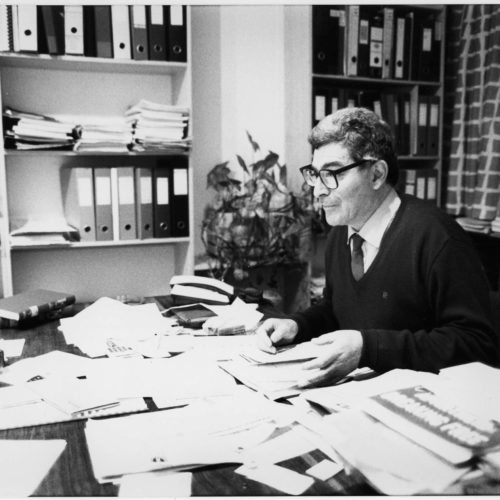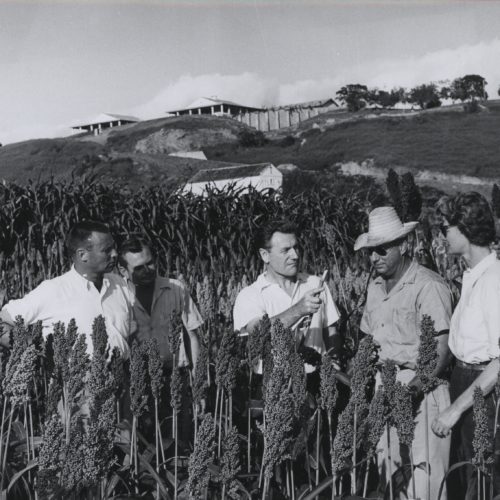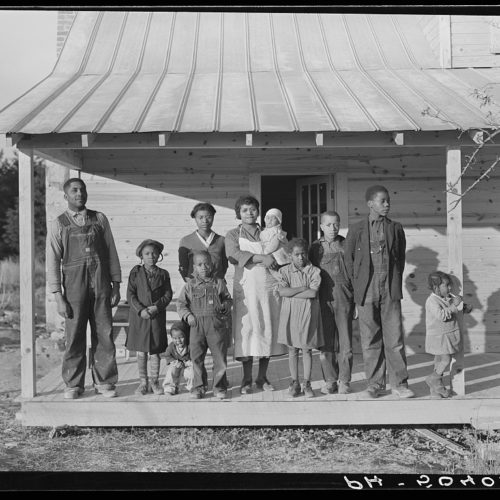This latest edition of our “New Research” series provides readers with an opportunity to read some recent archives-related publications. Available here are newly published reports submitted by RAC travel stipends recipients who have conducted research in our reading room, studying the records that we preserve and make available to the public. These reports showcase the wide range of collections that they have used, spanning different time periods, disciplines, and geographic regions. This set of reports cites records from the Ford Foundation and the Rockefeller Foundation, as well as the papers of Robert Kokernot and Kenneth Smithburn.
“’Training as against Doing’: Teaching the Language of Development at the Saudi Institute of Public Administration” by Gabrielle Printz
Gabrielle Printz came to the RAC to study the Ford Foundation’s support for reforming the government bureaucracy in Saudi Arabia, an interesting chapter in philanthropic activities in the Middle East. Her report, “‘Training as against Doing’: Teaching the Language of Development at the Saudi Institute of Public Administration,” looks at an episode in the kingdom’s efforts to lay the groundwork for a modern administrative state, including the strengthening of the government employee base. To this end, the Saudi government turned to the Ford Foundation in the 1960s and 1970s to develop and coordinate the English Language Program, which was designed for civil servants at the Institute of Public Administration. Printz notes that while Ford Foundation already had a long history of assisting national development projects in various countries around the world, its funding of this project was structured very differently. While the foundation supervised recruitment and staffing of the language program, the work was executed through an unusual arrangement of subcontractors and used non-Saudi organizations. There were points in which this complex structure proved susceptible to missteps, yet the foundation’s readiness to embrace this type of funding reflected its determination to assist the kingdom in finding a path to adjust to a modern world.
Gabrielle Printz is a doctoral student at Yale University School of Architecture. Her research interests include the intersection of architecture, capital, labor, and state-making, with a focus on developments on the Arabian Peninsula and in the Persian Gulf in the latter half of the twentieth century. She was a 2023 RAC research stipend recipient.
Museum Development in Postcolonial West Africa, 1980-2000: A Reading from the Archives by Ana Temudo Gaio Lima
Ana Temudo Gaio Lima’s research report, “Museum Development in Postcolonial West Africa, 1980-2000: A Reading from the Archives,” investigates efforts by newly independent nations in West Africa to foster their cultural institutions. Her specific focus of research is the National Ethnographic Museum (sometimes referred to as the “National Museum”) of Guinea-Bissau, which was established with international cooperation in 1988 following Guibea-Bissau’s independence from Portugal and then closed in 1998 due to a civil war. Important documentation about the museum was lost in the war, and Ana Temudo’s trip to RAC was an important part of her effort to both piece together aspects of the museum’s story and contextualize the museum’s development within a larger West African framework. At RAC, she found key records relating to Rockefeller Foundation and Ford Foundation support for the museum, particularly regarding Ford’s funding of the Western African Museum Progamme (WAMP) in the late 1990s. As she notes, this program “aimed to address… challenges by providing short-term courses, technical assistance, workshops, and exchanges to museums in West Africa.” She observes that philanthropic grants to programs such as WAMP provided vital aid to underfunded museums, yet were not devoid of problems often associated with such North/South collaborations including donors and recipients having different agendas and priorities.
Ana Temudo Gaio Lima is a doctoral student at Universidade Católica Portuguesa in its Heritage Studies program. Her research interests include aspects of museology and cultural studies in post-colonial African societies. She was a 2023 RAC research stipend recipient.
“The Antinomies of Agrarian Modernization in Cold War East Pakistan” by Mushahid Hussain
In “The Antinomies of Agrarian Modernization in Cold War East Pakistan,” Mushahid Hussain traces how concepts of rural development and modernization shifted in Cold War Pakistan. Early notions about the need to foster agrarian democracy were superseded by technocratic approaches more focused on controlling population and raising food crop yields. Dr. Hussein came to RAC to study the Ford Foundation’s role in these programs, particularly the Comilla Academy for Rural Development in East Pakistan. Comilla was the hub (and a model) for a series of cooperative projects during the early phase of this agrarian reform process. Dr. Hussain points out that rural development in Pakistan was particularly complicated as a result of the newly independent nation’s political volatility, which brought changing priorities in government policy. Compounding the dramatic changes in Pakistan’s politics, the cultural, linguistic, and economic differences between the two “wings” of the country added another layer of tensions. These ultimately caused a reset for rural development projects by the 1971 war that created an independent Bangladesh.
Mushahid Hussain completed his dissertation at Cornell University in 2024 and began an appointment as assistant professor of sociology at Indiana State University. His research interests include the politics of social and economic change in South Asia, with a focus on Bangladesh. He was a 2023 RAC research stipend recipient.
“Tropical Medicine beyond Borders: Robert Hutson Kokernot’s Assignment in Apartheid South Africa and His Fieldwork in Colonial Mozambique (1954-1960)” by Felipe Barradas Correia Castro Bastos
Felipe Barradas Correia Castro Bastos’s research report, “Tropical Medicine beyond Borders: Robert Hutson Kokernot’s Assignment in Apartheid South Africa and His Fieldwork in Colonial Mozambique (1954-1960),” offers a first look at a recently opened collection at RAC. Robert Kokernot was a virologist at the Rockefeller Foundation, who for part of his career spent time in southern Africa studying emerging arboviruses. While the records of the Rockefeller Foundation document his work in this field, Dr. Bastos wishes to direct attention to the added value of Kokernot’s personal papers. He points out that Dr. Kokernot, while stationed with his family in Johannesburg, South Africa from 1954 to 1960, also traveled to surrounding countries in a region undergoing massive political, social, and economic change. The extensive correspondence with colleagues and family that are found in these personal papers provides important insight into daily life in apartheid South Africa. As an avid camera buff, Kokernot also used color film to capture his travels, filming unique segments of the cultural and artistic life of the period, particularly in colonial Mozambique. Dr. Bastos concludes his report by remarking that Kokernot’s professional contribution, “may far exceed the epistemological boundaries of tropical medicine” in that his thorough documentation created a rich trove of information on an important chapter in southern African history.
Felipe Barradas Correia Castro Bastos is an assistant professor of global history at the Universidade Estadual do Centro-Oeste in Brazil. His research interests include social history in Africa, focusing on anti-colonialism and labor in Mozambique and British East Africa. He was a 2023 RAC research stipend recipient.
About the RAC Research Stipend Program
The Rockefeller Archive Center offers a competitive research stipend program that provides individuals up to $5,000 for reimbursement of travel and accommodation expenses. Learn more on our Research Stipend page.


